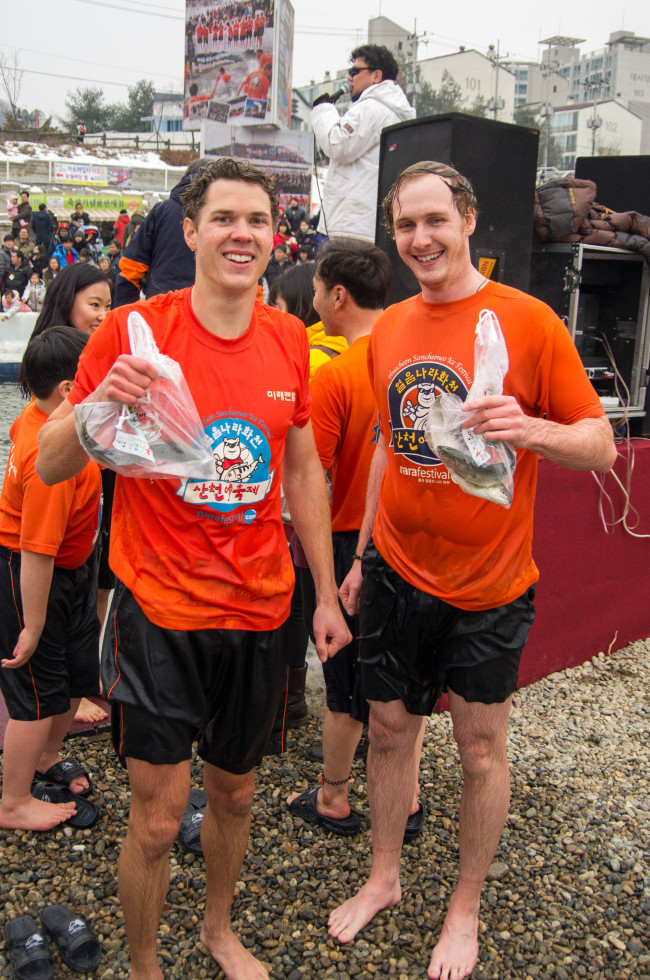HWACHEON, Gangwon Province ― Every morning in January, a pilgrimage of cars and tourist buses traces the winding routes through the snowy mountains of Gangwon Province. An early morning start is the only way to secure a good spot at what is quickly becoming one of Korea’s premiere wintertime events ― Hwacheon Sancheoneo Ice Fishing Festival.
A 2 1/2 hour coach ride from Seoul, Hwacheon has the appearance of a sleepy town inexplicably inundated with people. The faint hum of music is the only hint of a festival. But a 10 minute walk toward and through the center of town reveals scores of lanterns, stages, lights, sculptures and food stalls. Just as the music comes into focus, so does Hwacheon Stream, frozen under thick ice, surrounded by picturesque mountains and dotted with thousands of people.
An approximately 2 kilometer sector of the frozen stream is packed with fishermen, trying their luck at catching “sancheoneo,” a type of mountain trout endemic to the region.
Some lie face-down on the ice, trying to take a better look at the fish through a palm-sized hole. Others sit patiently until a pull is felt on the fishing line.
But for the more adventurous, it’s not the traditional ice fishing with a bait and lure that they come for. After all, they would have passed dozens of makeshift ice fishing areas on their way in. It’s the bare-hand fishing that sets this festival apart.
A 2 1/2 hour coach ride from Seoul, Hwacheon has the appearance of a sleepy town inexplicably inundated with people. The faint hum of music is the only hint of a festival. But a 10 minute walk toward and through the center of town reveals scores of lanterns, stages, lights, sculptures and food stalls. Just as the music comes into focus, so does Hwacheon Stream, frozen under thick ice, surrounded by picturesque mountains and dotted with thousands of people.
An approximately 2 kilometer sector of the frozen stream is packed with fishermen, trying their luck at catching “sancheoneo,” a type of mountain trout endemic to the region.
Some lie face-down on the ice, trying to take a better look at the fish through a palm-sized hole. Others sit patiently until a pull is felt on the fishing line.
But for the more adventurous, it’s not the traditional ice fishing with a bait and lure that they come for. After all, they would have passed dozens of makeshift ice fishing areas on their way in. It’s the bare-hand fishing that sets this festival apart.

Every day roughly 120 brave revelers take on the famous bare-hand fishing ponds over three sessions. Large crowds gather in an amphitheater and wait with eager anticipation as a procession of nervous men, women and children shuffle out of a heated tent wearing only shorts and a shirt.
After dipping their toes in the water for the first time, the adrenaline can be seen washing across their faces. Shivering on the edge of the pond, a signal is given for the daredevils to jump into the water and attempt to catch the elusive mountain trout with their bare hands.
A collective gasp marks the moment of icy immersion. The competitors plunge their hands into the water and grasp at the hundreds of trout darting about their feet. When a catch is made, the fish is promptly put down the front of the participant’s shirt. This process becomes noticeably slower and more laborious as time passes.
For those who aren’t having much luck there are festival assistants who catch fish and hand them out, but it’s not long before the water starts to empty of people.
After 6 minutes or so, even the sturdiest fishers make their way out of the pond and rush on numb limbs into a heated spa to recuperate and compare their catches.
Australians Derry Doyle, 24, and Lucinda Campbell, 21, said the experience was something they could never hope to enjoy at home and one they would never forget.
“I really don’t think you can find this sort of experience with this atmosphere many places in the world,” Campbell said.
Although she didn’t try bare-handed fishing, she said just watching the participants was more than enough entertainment.
Doyle did try his hand in the pond but didn’t have the success he had hoped for.
“I was made to look like a fool by a lot of the locals, who had their shirts full of fish while I wasn’t able to catch any myself. I definitely plan to come back again and give it another shot,” he said.
The fish caught bare-handed or otherwise can be cooked at one of the many barbecue stations that line the banks of the stream.
Those who aren’t keen on fishing have an array of other icy activities to keep them occupied. Ice skating, sledding, ice soccer, ice slides, a huge display of ice sculptures and an indoor exhibition are some of the other family-friendly options to keep revelers active and entertained.
The Hwacheon Sancheoneo festival continues until Feb. 1. The admission is 12,000 won for adults and teenagers, and 8,000 won for children and the elderly. For more information, visit www.narafestival.com (English available).
By Elliott Brennan (ebrannan@heraldcorp.com)
-
Articles by Korea Herald








![[Weekender] How DDP emerged as an icon of Seoul](http://res.heraldm.com/phpwas/restmb_idxmake.php?idx=644&simg=/content/image/2024/04/25/20240425050915_0.jpg&u=)
![[KH Explains] No more 'Michael' at Kakao Games](http://res.heraldm.com/phpwas/restmb_idxmake.php?idx=644&simg=/content/image/2024/04/28/20240428050183_0.jpg&u=20240428180321)









![[Herald Interview] Mistakes turn into blessings in street performance, director says](http://res.heraldm.com/phpwas/restmb_idxmake.php?idx=652&simg=/content/image/2024/04/28/20240428050150_0.jpg&u=20240428174656)
